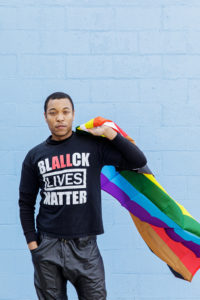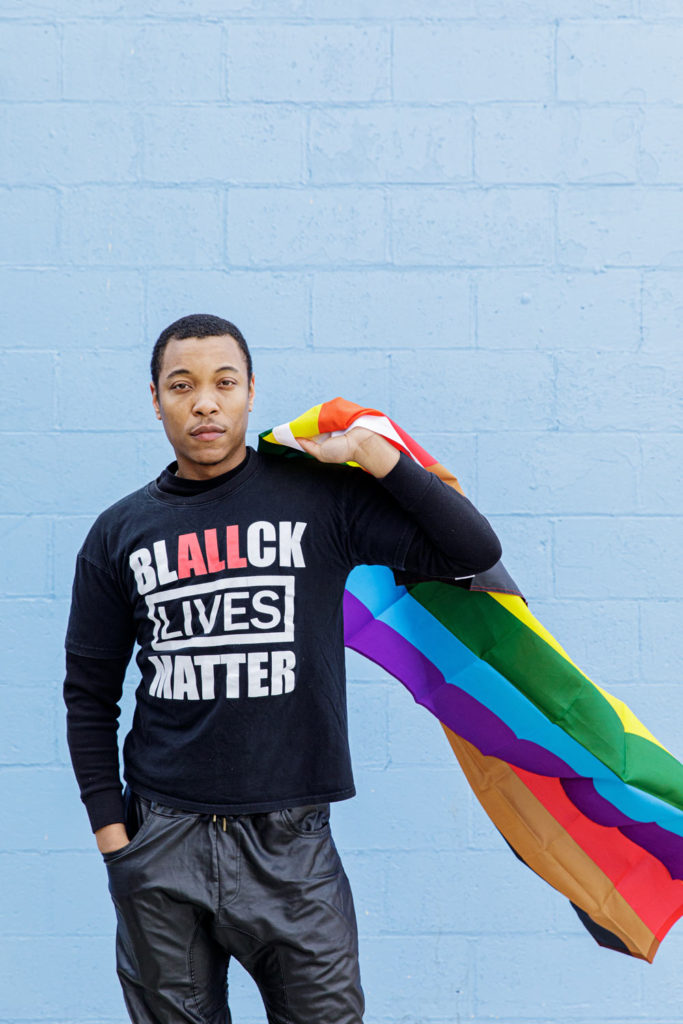Shining a spotlight on the queer community is this entrepreneur’s true passion
By Quinn Roberts
 As the LGBTQ community continues to gain prominence and influence, both in and beyond Connecticut, many are curious to know: how can we promote LGBTQ-owned small businesses at a time when they are threatened? And just who are these small-business owners keeping the LGBTQ community together?
As the LGBTQ community continues to gain prominence and influence, both in and beyond Connecticut, many are curious to know: how can we promote LGBTQ-owned small businesses at a time when they are threatened? And just who are these small-business owners keeping the LGBTQ community together?
Ephraim Adamz is here to ensure that Connecticut’s queer events remain by and for the LGBTQ community. From DJing and nightlife promotion to video production and music, the Hartford-based entrepreneur is something of a Renaissance man. And he’s especially passionate about shining the spotlight on queer Connecticut talent.
We spoke with Adamz about Pride, representation, and the joys of being an LGBTQ business owner.
CT VOICE: You had a very busy Pride season last year. You organized Six Flags New England’s Pride Fest and hosted DJ sets at various Pride festivals in Connecticut and beyond. Why do you feel it’s so important to recognize Pride each summer? What is your favorite part of every Pride season?
EPHRAIM ADAMZ: Every year is someone’s first Pride. I come back for the newcomers. Six years ago, I was in the closet, searching for liberation. An adult in my 20s who was still coming out, I had no knowledge of what Stonewall meant. I did not learn my history in school and I really needed guidance. But attending queer bars, community events, and getting involved in outreach brought out some of my best traits. I’ve developed empathy, compassion, and confidence, while still feeling free enough to admit my flaws. Sexual health, speaking with your doctor, not being afraid, knowing when to stand up for yourself, and meeting people who are different is something I encourage in every newcomer at Pride. In short, Pride means it’s never too late to love yourself.
There has been an ongoing prejudice at Pride that different music brings a “certain crowd.” My favorite part of Pride is challenging this prejudice. I’m the coordinator that’s not afraid to include rock, jazz, R and B, hip-hop, pop, Latin, house, Bollywood, Asian, throwbacks, and new-school music, all in the same set. Music speaks to culture and age, but it also transcends both. The type of food trucks speaks to folks, too. I tell board members that, “Yes, we’re vegans who enjoy brunch with mimosas, but gays from the hood drink tequila and henny! Did you know that bisexuals are people too? Are we going to have a Womxn night?” I always have someone thank me for acknowledging that queer people come from all walks of life. I am just here to continue breaking barriers.
Q: At World Pride in Manhattan, you had the honor of working with the cast of FX’s hit television show “Pose.” How was the experience? Are you a fan of the show?
A: “Pose” is making history with its spotlight on queer and trans people of color. I met Dominique Jackson briefly; she is so gorgeous and nice.
It’s very difficult to juggle my own intersectionality at times. Am I black enough? Am I too assimilated? Am I gay enough? Am I butch enough? What makes me a man, my looks or my manners? Am I ugly or am I cute? Do I matter? I still ask myself so many questions. Content with more real-life issues and identities is greatly needed. I didn’t grow up with a “Pose” poster on my wall, so I’m jealous, but I’m glad television is catching up.
Q: The coronavirus crisis is certainly going to put a wrench in our summer plans for Pride 2020, but the great thing is that the LGBTQ community knows how to thrive under pressure. How are you reacting to the shifting plans? What do you say to anyone worried about Pride being in jeopardy?
A: Pride 2020 matters because it marks the 5th year of marriage equality in the United States. Celebrate your partners, reflect on your relationships and dating. Yes, Covid-19 has put a damper on festivals, but we have to remember that Pride is more than just gatherings.
I encourage everyone to become more involved, despite social distancing. Donate. Host a food pantry for queer homeless youth that have been denied by their family. Have a wig drive for struggling trans women of color, who face discrimination in the workplace. Send a card to queers in senior living facilities who never had the opportunities we have. Teach a young queer person about the history of Stonewall and what it means. Know your HIV status, in case your immune system might put your health in compromise. It hurts to discuss our reality, because statistics are used to bully us and stereotype us; I assure you that we can help each other at the root of the community, especially in times of uncertainty.
Q: As LGBTQ culture and media continues to gain prominence and popularity, how do you feel this affects business owners and content creators within the community? How important is it that LGBTQ culture remains by, about, and for the community?
A: People like to stereotype and say, “Oh you’re gay, you must be a hairdresser.” The truth is, we’ve always been very influential in business, art, and fashion. The traditions started by black and queer communities are why your favorite pop stars are so fiercely fabulous. But entertainment is not where it ends. We’ve been your business assistant, clothing designer, stage director, choir coordinator, wedding planner, dance choreographer, computer technician, and more. We are just kept behind the scenes due to homophobia. If not homophobia, then colorism. If not colorism, then race, gender, age – the list goes on. We’ve always been here, we’re still here, but we are just not always allowed to be the face of it.
Q: In addition to DJing, hosting and events production, you also operate an audio/video production business and produce music. How do you manage to balance these different ventures while maintaining a coherent personal brand?
A: The short answer is internet and social media. Film has always been an interest of mine since middle school, so I taught myself video. By high school and college, the wave of YouTube, Myspace, and Facebook swept us all in. I got a head start and yet I still feel late. Now anyone can create a video with a cellphone!
Professionalism, high quality, and healthy numbers is what businesspeople want. I’m going through a very crucial stage in which I have to figure out compromise. Some clients see Pride as dollar signs, and that can be problematic in certain situations. Knowing my purpose, our history, and who and what I stand for really helps. When I feel stressed, I can put it in a song. Oh, and drag queens! Everything I learned or admire about juggling business, DJing, and music I learned from drag queens. They’ll out-work you and sashay away with the prize.
Q: You make a point to promote and collaborate with local Connecticut talent as frequently as possible. What is it about Connecticut’s LGBTQ scene that fuels your drive?
A: I was born in Hartford. I moved to the south at age 2 and returned when I was 19. No matter where I travel, I will always show Connecticut love. One reason it’s important for me to shout us out is because we are surrounded by New York, Boston, Providence, and New Jersey. Our community has our differences, like everywhere else, but we are still a force to look out for.
Q: What is one thing people might not guess about you from a first impression?
A: I’ve known my orientation since puberty, but people are surprised to learn that I didn’t come out until age 27. I skipped school so I wouldn’t be bullied, I ran away from home for fear of telling my family, I dated women as a form of denial. I felt empty as a youth in the ‘90s, with no queer role model, few gay men of color in the media, and the legacy of the AIDS pandemic.
You are never too old to come out. Be the best you and inspire someone. I am by no means perfect, but I refuse to be invisible.
Find Ephraim Adamz on Facebook and Instagram, and hear his music on iTunes, SoundCloud and YouTube.








More Stories
Connecticut Sun: Playing for Good
Call Him Mister Connecticut: Jean Carlo Salazar’s Journey as Nurse, Model and Pageant Contestant
Ensuring a Seat at the Table